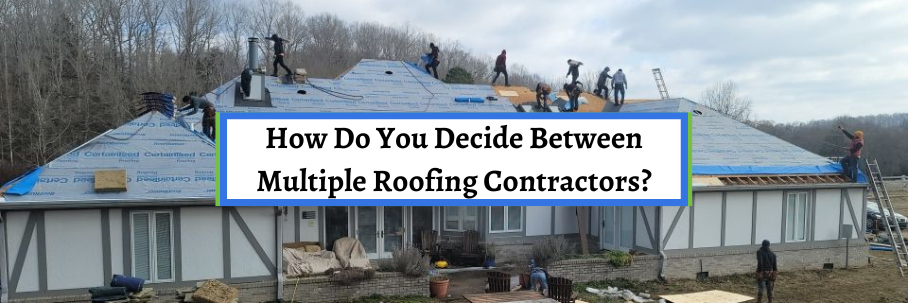How Do You Decide Between Multiple Roofing Contractors?

The roofing contractor you hire impacts every aspect of your future roof investment. So, it’s always a good idea to find two or three roofing contractors to find the perfect fit.
But once you narrow down your potential roofing contractors, you’ll need to look for certain things to make the best decision. Unfortunately, most homeowners don’t know what to look for and usually go with the most persuasive salesperson or the lowest price.
This leads to the potential of being taken advantage of by a roofing contractor. I don’t want this to happen to you.
For over 30 years, the team at Bill Ragan Roofing has helped homeowners make the best decisions for their upcoming roofing project. This article will help you do just that.
Let’s get to what you should look for when deciding between different roofing contractors.
Make sure the roofing contractors have all the appropriate paperwork
Every roofing contractor should be licensed, bonded, and insured. So, the very first thing you should do is make sure each roofing contractor has all the appropriate paperwork to do the job.
They must also be licensed, bonded, and insured in your state specifically. If one or even two of the roofing contractors don’t have the paperwork, then the decision is easy.
Don’t be afraid to ask for proof and to see copies. You may be thinking, “Is it really important for a roofing contractor to be licensed, bonded, and insured?”
Yes, it really is that important. Below is a quick breakdown of each one of the crucial pieces of paperwork.
Licensed
For a contractor to get a license, all they must register with your state’s board of licensing contractors. The price of the job will determine what license they’ll need.
For example, a job over $3,000 requires a home improvement license and anything over $25,000 requires a general contractor’s license. Roofing contractors should have a general contractor’s license because a roof is a large investment.
Bonded
Being bonded means that a bonding company knows that a roofing contractor does business correctly and ethically. A bond protects you in the event of the roofing contractor going out of business during your project or if there's a problem with the work and they won't fix it.
If this happens, you can fall back on the bond company to take care of the problem. If a roofing contractor is bonded, the bonding company believes the contractor will do the job correctly.
Insured
All roofing contractors should be fully insured with general liability, workman's comp, and a company vehicle insurance policy on all owned and unowned vehicles.
General liability insurance and workman’s comp limits depend on the size of the roofing contractor’s jobs and the specific state. If you hire a company that only does small residential work, their general liability will not be as much as a company that does larger jobs.
The big takeaway is that you shouldn’t think about hiring a roofing contractor if they aren’t licensed, bonded, and insured in your state. Without this paperwork, you’ll have zero recourse if something goes wrong.
Compare the different roofing contractors’ reviews
I’m sure you did a simple Google search to find the roofing contractors you’re considering. But now you need to dig a little deeper into their reviews.
Look at and compare the reviews for the potential roofing contractors from the past 2-3 months. This ensures you’re getting the recent good or bad experiences.
You can pull a lot of information from reviews to learn if a roofing contractor does quality work. Not all the reviews you read are accurate because people tend to go to extremes one way or the other.
But if a roofing contractor stands behind their work, interacts positively with customers, and does things the right way, then it’ll show up in their reviews.
Make sure each roofing contractor is established in your area
The next thing you need to compare is the service histories of the roofing contractors. You need to make sure they have a strong history and are well-established in your area.
I’m not saying that an older company is better than a newer one. However, you can count on a more established roofing contractor being around if there's a future problem.
Just know that there’s a good chance a newer roofing company’s prices are a lot cheaper. I understand it's tempting to chase lower prices.
Unfortunately, the problem is that they don’t know how to price jobs correctly to get them through the winter or slow months. This is when most new roofing companies shut down.
Now, there are very good young roofing companies out there. However, you just want to make sure they'll be around to take care of your roof investment five years from now if a problem pops up.
Look at the workmanship warranty of each roofing contractor
Speaking of being around to take care of any potential problems, the next thing you need to compare is the warranty each roofing contractor offers. While you’ll have a warranty on your roofing materials, the one you need to compare is each roofing contractors’ workmanship warranty.
A workmanship warranty protects you from improper roof installation or any other mistakes during the installation process. Every roofing company should offer you some kind of workmanship warranty.
Workmanship warranties vary and can be 1 year, 2 years, 3 years, 5 years, 10 years, 25 years, or even a lifetime. When comparing the warranty information, you should only consider a roofing contractor with a 10-year workmanship warranty.
But you should really look for the one that provides a lifetime warranty or close to it (25 years). This shows you they take pride in their work and stand behind it even if something goes wrong.
If a roofing contractor doesn’t offer any kind of workmanship warranty, don’t consider them and throw that estimate out of the mix.
Compare the estimates from each roofing contractor
While comparing the warranty information is crucial, so is comparing the actual line-by-line times of each roof estimate. These items are everything included in your roof replacement, from the roofing components to the roofing contractor’s labor and much more.
Everything that impacts the cost of your new roof should be included as a line item. When comparing the line items on each estimate, make sure they include the same exact information.
This helps you see why the different roofing contractors charge a lower or higher price. Most of the time, it’s because they have different overhead costs or one has a higher labor cost.
But some roofing contractors leave off required materials or use a different material to lower the overall price. A common one I see is using 3-tab asphalt shingles as ridge capping.
Keep in mind that a lower-priced estimate isn’t wrong or means a roofing company is trying to take advantage of you. But if the line items are different on the lower-priced estimate, there’s a good chance something was left off, or it will show up later as a hidden fee.
Ask the right questions when meeting with the potential roofing contractors
Now you know what you need to look for and compare when deciding between multiple roofing contractors. With this advice, you can be confident that you’re making the right decision.
But there’s still one more foolproof way to ensure you make the right decision. This is asking the right questions when meeting with or talking to the potential roofing contractors.
Unfortunately, most homeowners don’t know what these questions are. That’s why I created a checklist of the 16 questions every homeowner needs to ask potential roofing contractors.
The checklist also includes the answers a reputable roofing contractor should give back. With this checklist, you’ll be even more confident in your hiring decision.
Since 1990, the team at Bill Ragan Roofing has provided high-quality roofing services to thousands of homeowners in Nashville and surrounding Middle Tennessee areas. We take pride in everything we do and back up our workmanship with a lifetime craftsmanship guarantee.
If you’re local to Nashville or a surrounding Middle Tennessee area, don’t hesitate to Contact Us for any of your roofing needs.
Here’s your free Checklist of 16 Questions to Ask a Roofing Contractor to ensure you make the right hiring decision.


